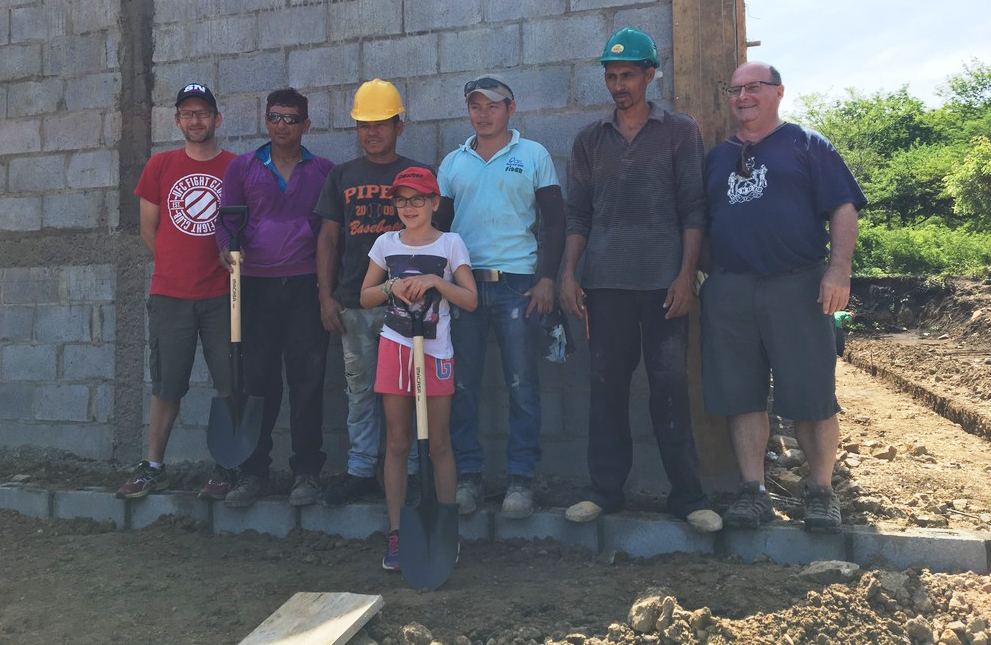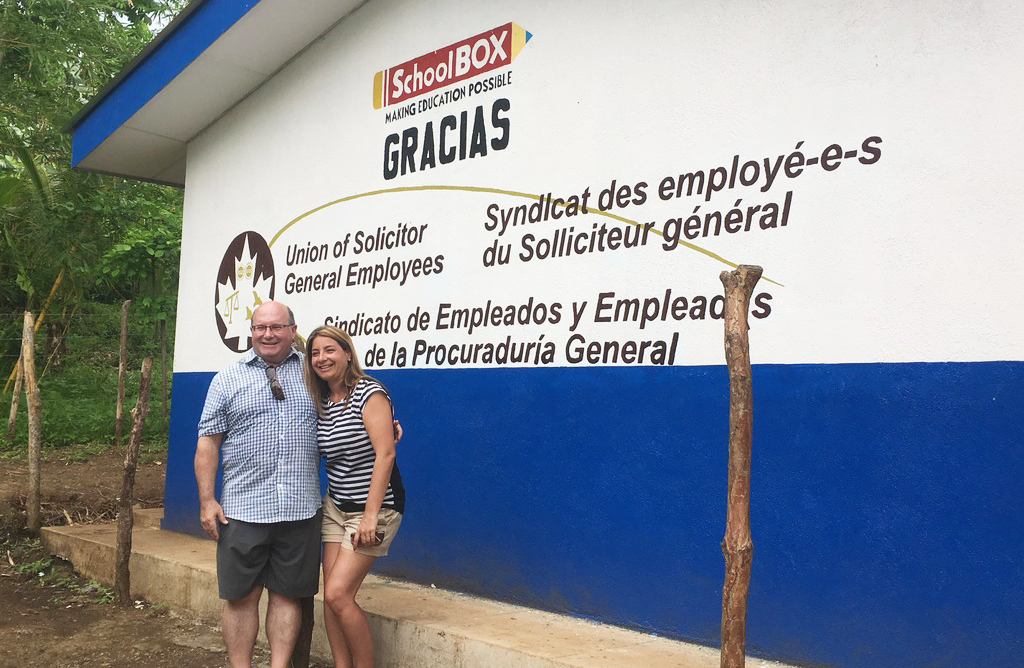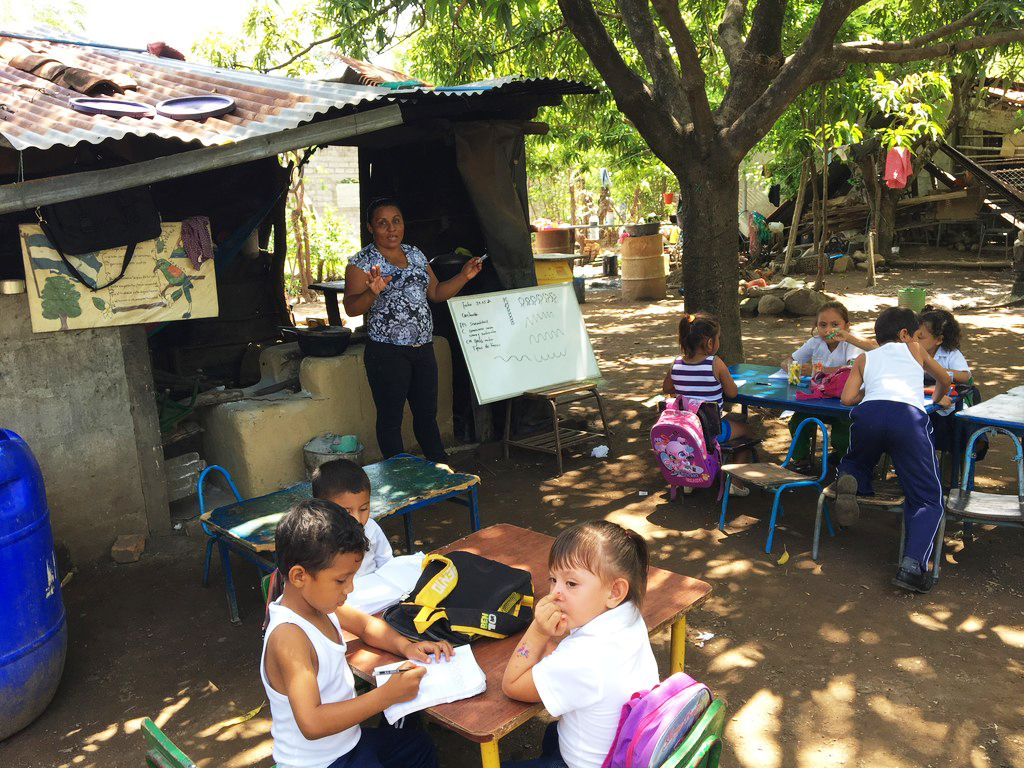By Lynette Robinson, Regional Vice-President
It’s been almost a month since returning from Nicaragua and I’ve found it difficult to explain my experience in writing as this has affected me on many different levels.
To begin, my 8-year-old daughter and my husband both came with me. We travelled to a remote and extremely poor part of Nicaragua called El Puma about 15 minutes from the Honduras border; if you search it on Google Maps, it doesn’t exist. The residents make about $70 USD a month working with mercury and crushing sand in hopes to find gold. While Canadians are typically living paycheck to paycheck, the community we visited are living meal to meal. It’s difficult to explain in words and nearly impossible to understand this poverty without seeing it for yourself.
Even though we received the instructions and details of the project, nothing could have prepared us for the reality of being there. Kids are currently studying in lent “homes” from community members which are dark, dingy and scorching hot. 29 toddlers are studying outside in their teacher’s yard and when it rains they go into their teacher’s tiny house. They do have white boards, but they are not in any condition to be effectively used.
It’s during the school day visit that it really hit my daughter that the conditions some children have to study in is the reason why we were there — to help bring the children in Nicaragua better learning conditions. They need bright classrooms with windows to allow a breeze, proper desks, whiteboards and school supplies.


Once completed, in a few more weeks, the school will be by far the most beautiful building in the community. SchoolBox had the volunteers digging a trench in weather that exceeded 34 degrees. Nothing is “easy” here, water needed to be collected from the river to make concrete, sand needed to be shoveled off the truck onto the ground, (there wasn’t a dump truck to simply pour it out) and rebar is cut, tied and twisted piece by piece… and this is just a small part of the project we were part of. But we worked hard and members of the community volunteered their time in the hot sun because they also know and value the importance of education for their children.
The community members were very excited when we arrived, especially the children (and even teenagers). They loved to play and laugh, and especially wanted to be given a really good genuine hug. They planned a few events during the week we were there, a welcoming event, Mother’s Day and our farewell fiesta. We enjoyed the local dancing, joined in a few dances and I also participated in a Mother’s Day dancing contest. The department of education as well as the principle of the school and other community leaders joined us for some of the festivities to thank us and SchoolBox for helping to make education possible in Nicaragua. The welcoming event was probably one of the most emotional times we had, as it was a surprise to see how long the community prepared for our arrival even greeting us with banners with our names.
Throughout the week, we worked on the school with the SchoolBox members and community volunteers, and also spent much of our time encouraging the children to stay in school. I’m a firm believer that education can and does change the course of our lives. It opens doors and creates opportunities. Many of the younger children have hopes and dreams of becoming teachers, doctors, lawyers, translators and engineers. I’m hoping, with the new school we’ve helped built, the children will have an extra drive to learn and go to and stay in school. Many kids drop out to go to work or can’t attend because they have no supplies. When SchoolBox builds a school in the community, education is free and all kids get a school supply package.
While we were in Nicaragua, we had an opportunity to visit the school USGE helped fund in Masaya to hand out supplies on one of our last days in Nicaragua. The community members, including the fathers, attended the event to meet us. One parent gave an incredible speech saying it was impossible to dream that her kids would ever have gotten a new school, how incredibly grateful she was to us for providing this for her children. When understanding the poverty within the rural areas the statement this parent made is very real and came from the bottom of her heart. Each year kids get a small package of supplies (a few note books, 2 pencils, coloured pencils… nothing extravagant by any means) and it’s big, important, and exciting day. On that day, they call out each child’s name, from preschool to grade 6, just like we would do on graduation day. Each child then has a photo taken with their new school supply package.

I found the story of SchoolBox interesting since it started when a Canadian, Tom Affleck, gave the only items he had with him, a notebook and a pencil, to a young child in a rural community in Nicaragua. After the child received the “gift” his father was overjoyed and said “now my child can go to school this year”. This was a surprise to the Canadian as he didn’t think his present was a worthy one. But once he realized this reality, he did something about it.
Life is very different in Nicaragua than it is here in Canada, we certainly take a lot of things for granted. I’m so thankful USGE organized with SchoolBox to make education possible for children that otherwise may never had the opportunity to have an education.
As union members and as part of the labour movement, we have an important role in working together to make the world a better place for everyone. Inequalities stretch beyond our own selves and our own country. We are fighting to improve social and economic standards for people around the world, making education possible is a great place to start. My journey (visiting Nicaragua to build a school) was self funded. It was well worth the personal experience, the experience for my own family and especially worth it to see the smiles on the children’s faces and just how grateful the community members were as well. It’s hard to believe that education isn’t a “given”, but the reality is, even in 2017, in some parts of the world, it’s a luxury.
